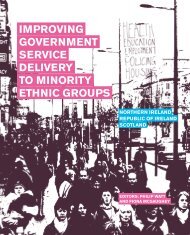4858 Mental Health Report - National University of Ireland, Galway
4858 Mental Health Report - National University of Ireland, Galway
4858 Mental Health Report - National University of Ireland, Galway
Create successful ePaper yourself
Turn your PDF publications into a flip-book with our unique Google optimized e-Paper software.
Collaborative Practice and Policy<br />
There is a value in developing relationships and building in evaluation from the<br />
beginning. The policies and procedures <strong>of</strong> individual organisations are important,<br />
and if they can be married to, or influence, government policy this would be<br />
important. One group suggested that all project evaluations could be<br />
amalgamated and a meta-analysis carried out. It was felt that it was important to<br />
ensure a linkage between the terms <strong>of</strong> reference, objectives, outcomes and<br />
evaluation.<br />
• Under what conditions could investment in cross border collaboration become<br />
more effective and efficient<br />
Government and organisational policy<br />
In order for cross-border collaboration to become more effective and efficient,<br />
one group clearly felt that there needs to be a demonstrable policy commitment<br />
at government level and not just a response due to the political climate. This<br />
sentiment was echoed by one <strong>of</strong> the other groups which was <strong>of</strong> the view that the<br />
value <strong>of</strong> cross-border work needs to be promoted from the top. A suggestion was<br />
made that there should be a steering group at Department <strong>of</strong> <strong>Health</strong> level, with<br />
representation from both sides <strong>of</strong> the border, who would set the agenda, ensure<br />
sustainability and comparability <strong>of</strong> data collection and evaluation.<br />
Another group pointed out that although cross-border working is currently<br />
prolific in the border regions, most <strong>of</strong> this work is undertaken by voluntary and<br />
community groups rather than statutory bodies. It was suggested that we need to<br />
identify and standardise what works and then incorporate this into joint health<br />
policy. Collaboration should be part <strong>of</strong> the core business <strong>of</strong> health organisations.<br />
One group suggested that the <strong>National</strong> <strong>Health</strong> Census (in the South) could be<br />
automatically collaborative and carried out in partnership.<br />
Identified needs and access to information<br />
Most <strong>of</strong> the groups felt that project work should be based on identified needs.<br />
One group suggested that there might be a need for a cross-border body or<br />
organisation to assist in the identification <strong>of</strong> needs. It was also suggested that a<br />
central resource to access collaborative project information, to avoid duplication<br />
and emulate good practice would be most useful. Similarly, another group<br />
suggested the development <strong>of</strong> a central register <strong>of</strong> cross-border projects where<br />
the details <strong>of</strong> work going on are available on an Internet site for all interested<br />
parties. Information was seen as being very important but it is essential that<br />
those involved in cross-border work know how to access this information.<br />
Evaluation<br />
Evaluation figured strongly in most <strong>of</strong> the group discussions, with many<br />
reiterating the need for more evaluation <strong>of</strong> work done, evidencebased<br />
practice, report dissemination and publication. Evaluation<br />
is also needed to ensure that the objectives <strong>of</strong> cross-border<br />
working are clear. Tied to this is the need for clearer aims and<br />
67
















